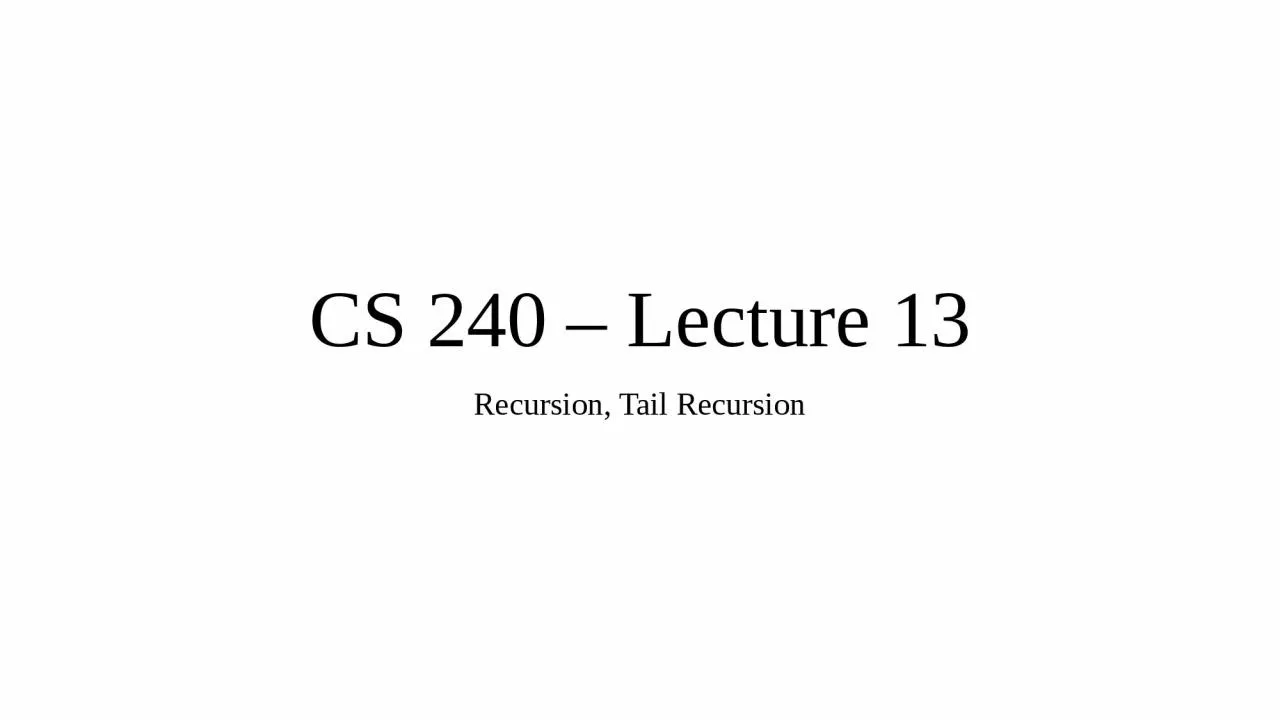

Tail Recursion Recursion Recursive Calls to a Function To review a topic you should have covered recursion in programming is the act of a function or procedure calling itself or otherwise making use of itself in its definition ID: 1015712
Download Presentation The PPT/PDF document "CS 240 – Lecture 13 Recursion," is the property of its rightful owner. Permission is granted to download and print the materials on this web site for personal, non-commercial use only, and to display it on your personal computer provided you do not modify the materials and that you retain all copyright notices contained in the materials. By downloading content from our website, you accept the terms of this agreement.
1. CS 240 – Lecture 13Recursion, Tail Recursion
2. Recursion – Recursive Calls to a FunctionTo review a topic you should have covered, recursion in programming is the act of a function or procedure calling itself or otherwise making use of itself in its definition. int factorial(int n) { return (n > 1) ? n * factorial(n-1) : 1; }Above we have an example, the canonical example of the factorial function.factorial makes calls to itself as part of its function body, which is recursion.
3. Recursion – Anatomy of Recursive FunctionsIn programming, single recursion is the act of a function directly calling itself.factorial calls factorial.There is also multiple recursion in which a function f calls some other function which, before terminating, eventually leads to another call to f.No good practical examples of this to talk about just yet, but it’s very common in parsing programs and compilers.In the end, a recursive function must have a stopping condition or it will infinitely loop.
4. Recursion – Anatomy of Recursive FunctionsIn short, a single recursive function has the following.A stopping condition with a base case.Without this, the call is infinite.A call to the same function.Without this, the call is not recursive. int factorial(int n) { if (n <= 1) return 1; return n * factorial(n-1); }
5. Recursion – How it affects the Call StackDuring a recursive call, we create a stack frame just as we would for any other function call.However, since we are calling the same function, every stack frame is associated with the same function.Depending on how many iterations occur, the stack can get pretty full.333221StackPointerStackPointerStackPointerStackPointerfactorial(3)
6. Recursion – Impact on PerformanceImpact on TimeCreating and clearing stack frames takes time.When you call a function, there are operations to push variables onto the stack.You also need to push on return information and instruction addresses.Also, when the function terminates, the stack frame needs to be removed.Impact on MemoryAs we saw before, the deeper the recursion, the more stack frames are created.Also, infinite loops WILL result in a stack overflow unless there is some OS protection.For these reasons, recursion should not be used in serious applications UNLESS certain optimizations are done.
7. Recursion – Optimizing with Tail RecursionTail recursion is a type of recursion where the last thing that happens in a recursive function call is either the return of the base case or the recursive call.The definition we had for factorial is NOT tail recursion. int factorial(int n) { if (n <= 1) return 1; return n * factorial(n-1); }The 3rd line of the function, the last thing that the call would do is multiplication.
8. Recursion – Optimizing with Tail RecursionAt first, this will look like some black magic, but the way to rewrite the factorial function in tail recursion makes use of another argument. int factorialHelper(int n, int a) { if (n <= 1) return a; return factorial(n - 1, n * a); }The a variable above acts as an accumulator.You’ll need to start every call to factorial with a = 1. int factorial(int n) { return factorialHelper(n, 1); }
9. Recursion – Optimizing with Tail RecursionWhy is this better?The tail recursive function has already pretty much completed by the time it makes the recursive call to itself.Because of this, the content of it’s stack frame is useless?Why is that better?Because the stack frame is useless, compilers can identify tail recursion and decide that they can REUSE the useless stack frame instead of creating a new one.This solves the memory impact of recursive functions!
10. Recursion – Tail Recursion in MemoryHere, we calculate factorial(3) just like we did before, but we show the stack as we go through the iterations with tail recursion instead.This is an optimization that most modern compilers do.It can be turned off, so be careful.3StackPointerStackPointerfactorialHelper(3, 1)12316an